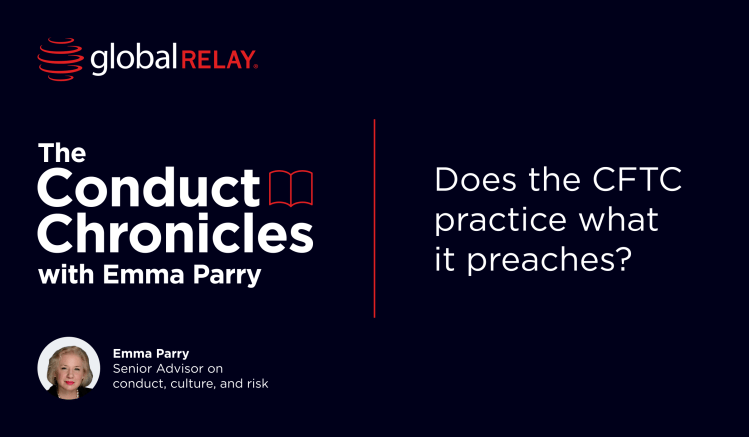
The Conduct Chronicles – Does the CFTC practice what it preaches?
Emma Parry examines the CFTC's performance, revealing concerns about its conduct in legal proceedings and internal operational failings, highlighting the urgent need for reform and accountability.
Written by a human
We expect, and indeed place trust in, regulators discharging their duties with the upmost integrity, ethical standards, and in accordance with the relevant laws and judicial proceedings. It seems incredible therefore that we are reading statements made from within the ranks of the U.S. Government, of misconduct at the heart of the U.S. government, perpetrated by the very people who should be upholding the law.
The reference point is CFTC Commissioner and Acting Chairman Caroline D. Pham, who has issued numerous statements, over numerous years, raising a very long list of very specific concerns. That long list includes:
“The CFTC’s lack of procedures, improper expansion of jurisdiction incorrect application of the law increased delegation of authority dubious enforcement actions and unfair adjudicatory proceedings, failure to comply with the APA [Administrative Procedure Act], and general disregard for due process.”
Public trust is paramount
Quite rightly, in May 2024, Pham stated “the Commission must uphold the highest standards of integrity, diligence, and excellence to maintain the public’s trust.”
Not only has trust in the CFTC been undermined, but of significant concern, the issues Pham has repeatedly highlighted have also led to court filings being dismissed. In some cases, there have been insufficient facts to support a charge, and others have been overturned in appellate court, suggesting that the CFTC does not understand the application of its own statute and regulations.
Pham notes that:
“It’s important that the Commission is proactive now and takes stock of our own approaches to rulemaking, enforcement, and other administrative actions, that we acknowledge our issues, and that we get help when we need it.”
Here are just three examples that underscore why Pham has continued to sound the alarm, and is advocating for change.
Court case 1: CFTC v Traders Global Group
The CFTC initially filed a lawsuit against Traders Global Group and its founder, Murtuza Kazmi, alleging they defrauded customers by misrepresenting the nature of their trading accounts and by using a “prop trading” platform that was actually a Ponzi scheme.
However, the court found that the CFTC had made errors in a sworn declaration, made false statements, and took steps to obfuscate information during the litigation. This led to the court dismissing the CFTC’s case with prejudice. It also imposed sanctions on the CFTC, including an award of attorney’s fees to Traders Global Group.
Pham acknowledged the court’s findings and stated that:
“This is a grave matter, and we, the Commission, will be subject to intense scrutiny over how we handle the alleged CFTC misconduct. This type of behavior cannot be tolerated at a law enforcement agency. Tone comes from the top, and therefore, I urge my fellow Commissioners to … finally take full accountability and appropriate corrective action to address the conduct issues and support CFTC staff.”
Court case 2: Goldman Sachs & Co. LLC v CFTC
Goldman Sachs faced a $5.5 million fine from the CFTC due to recordkeeping violations, including a failure to adequately address issues with the Truphone mobile phone recording system. Specifically, when Truphone’s recording service experienced failures in March 2020 due to increased usage during the pandemic, Goldman Sachs is alleged to have been slow to replace the vendor hardware.
The CFTC order notes that Goldman Sachs did eventually remediate the issue by replacing the vendor hardware, but claim delays contributed to the recordkeeping violations.
However, in Pham’s dissenting statement, she states that “this enforcement action is fundamentally unfair, unjust, and does not best serve the public interest.”
She went on to state that:
“This order and settlement reflects the Commission’s disturbing trend of “examination by enforcement”—where the Division of Enforcement imposes a disproportionately high civil monetary penalty for one-off, non-material operational or technical issues with no misconduct, harm to clients, or financial losses, and that every other major regulatory authority addresses through an examination program conducted by supervisory staff (i.e., examiners).”
Finally, she criticises the CFTC’s approach noting that “By taking this approach, the CFTC is an outlier amongst U.S. and non-U.S. regulators.”
Audit report: Audit of the CFTC’s compliance with the Government Charge Card Abuse Prevention Act
Whilst the audit did not identify any monetary violations, the Office of the Inspector General’s (OIG) report and recommendations confirm the CFTC’s non-compliance in areas related to training, card deactivation, transaction preapprovals, travel card usage, and policies. This non-compliance raises a broader concern. If there are failings around preapprovals for transactions, as an example, are there other policies and procedures being flouted?
Pham acknowledged the specific issues, alongside recognizing the broader implications arising from the audit findings. She used the report to underpin her call for a Government Accountability Office (GAO) study, emphasizing that such a study “will support my efforts to strengthen the CFTC’s management accountability and governance.”
Building from a firm foundation
It’s not the first time that Pham has called for a GAO study to surface and address the many issues that have arisen over the years – many of which she has spoken and written about. In fact, it has become her clarion call!
In May 2024, Pham reiterated the need for a GAO study, but this time in the context of the potential expansion of the CFTC’s scope, given that, on top of its existing mandate, the CFTC may also find within its purview, emerging technologies (eg. crypto, AI). Pham states that “it’s time for the CFTC to finally have the benefit of comprehensive studies and recommendations to make sure we are prepared and able to carry out our mission.”
Do as I say, not as I do!
We look to regulators to champion fair consumer outcomes, to uphold market integrity, and to protect against fraud, market abuse, and market manipulation. We entrust regulators to seek, and indeed to succeed, in prosecutions against those involved in criminal activity. We also expect those same regulators to be run effectively and efficiently, and with the greatest integrity and ethical standards. It can never be a case of ‘do as I say, not as I do.’



